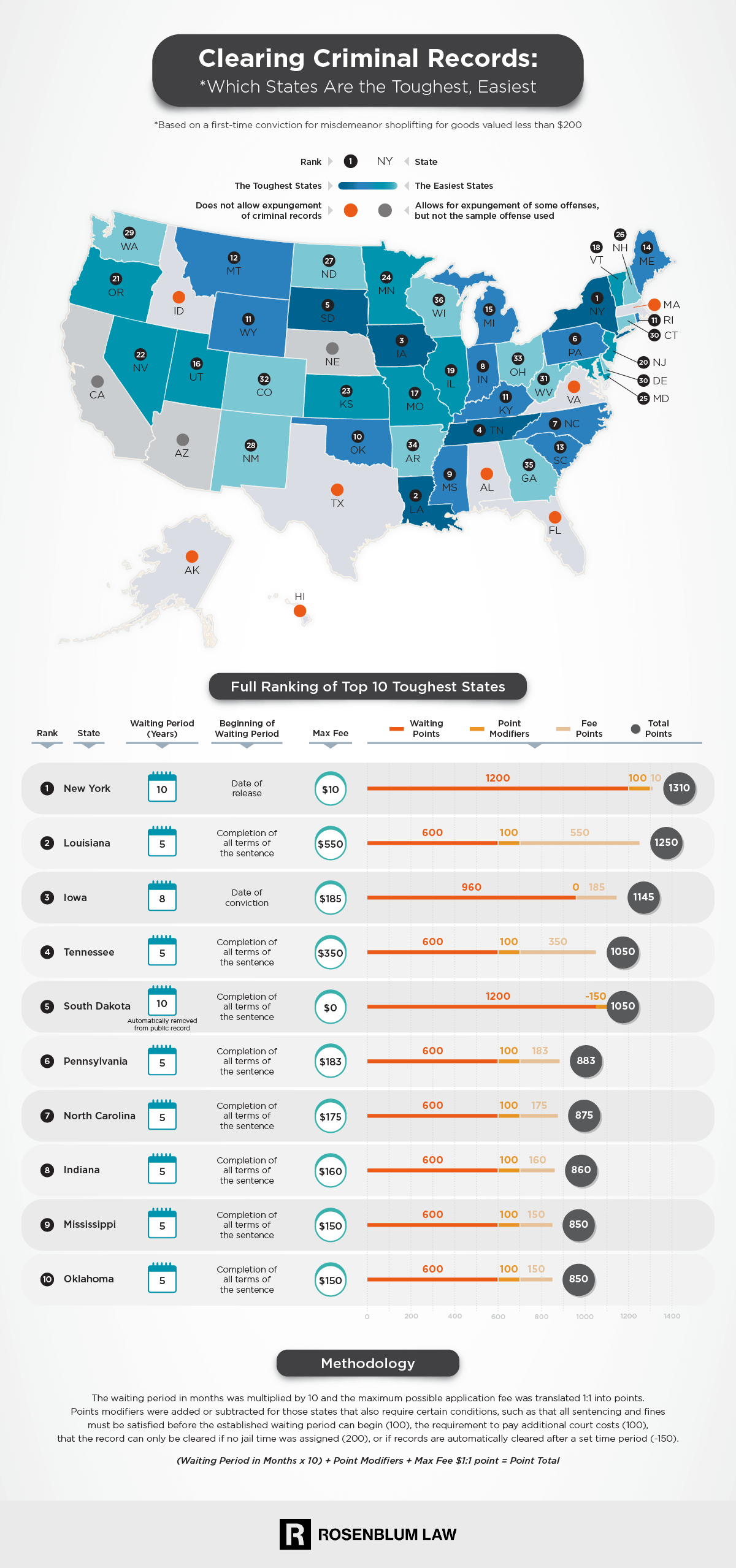New York, Louisiana, and Iowa Strictest; Arizona, Georgia, Wisconsin Most Lenient Based on Criteria from Rosenblum Law
Author: Adam H. Rosenblum Esq. | Published: Jan 6, 2020

Beyond the topic of marijuana-related convictions, there is little discussion about how a criminal conviction impacts a person’s ability to reintegrate with society, including getting a job, attend school, obtain housing, etc. Studies have shown that simply having a criminal record increases the likelihood that a person will commit another crime in the future.
Despite these facts, many states have stringent policies to expunge criminal records for misdemeanor offenses, such as shoplifting something worth $200, which can have a long-term impact on an individual’s future success and prosperity. At the top of the list is New York, based upon a study conducted by Rosenblum Law that ranked the states based upon their expungement process. This is unacceptable to many lawmakers, including New York State Senator Alessandra Biaggi (Democrat; 34th Senate District) and New York State Senator Jamaal Bailey (Democrat; 36th Senate District).
“We need to focus on rehabilitation and education. When we look at expungement and effectively changing the process, we have to be honest about how our laws have been unequally applied,” said Senator Biaggi. “We have to be careful about how we draft the next set of laws, so people are not criminalized for the rest of their lives.”
“We need to focus on rehabilitation and education. When we look at expungement and effectively changing the process, we have to be honest about how our laws been unequally applied.”

Alessandra Biaggi
New York State Senator
Senator Bailey agrees. “Far too many individuals have misdemeanor offenses and are unable to eradicate them. It’s unfair to those people who want to get on the right track but have a certain stigma attached to them. For lack of a better term, it’s a modern day scarlet letter. They have paid their debt to society and are abiding by the terms of their release. They should be allowed to reclaim their lives. Sealing records will allow for that.”
“Far too many individuals have misdemeanor offenses and are unable to eradicate them. It’s unfair to those people who want to get on the right track but have a certain stigma attached to them.”

Jamaal Bailey
New York State Senator
Fortunately, 42 out of 50 U.S. states have a process that allows individuals to clear some or all of their criminal records. The types of crimes that are eligible to be cleared vary by state. The same is true of the process, eligibility requirements, and cost of clearing a criminal record. As such, some states make it more difficult to clear a criminal record than others.
What follows is an analysis conducted exclusively by Rosenblum Law. The proprietary data provides insight as to which states have the largest barriers to clearing criminal records, and which ones make it the most accessible.
Barriers to Clearing Records
As mentioned, eight states – Alaska, Alabama, Florida, Hawaii, Idaho, Massachusetts, Virginia, and Texas – do not permit a person to clear any kind of criminal conviction. Among the remaining 42 states, there is often a multi-step process that one must undergo. These include, but are not limited to:
- Satisfaction of sentencing.
Before applying to have a criminal conviction cleared, most states require the person to complete any sentencing, which includes jail/prison time, supervised release, and usually payment of any fines. - Waiting period.
A person must wait a set period of time before applying to have a conviction cleared. The waiting period can be anywhere from two months to 10 years, and most often begins after the sentence has been satisfied–e.g. if the waiting period is 5 years and the sentence is 2 years in prison with no fine, then the person will have to wait 7 years from the start of his/her prison term before filing the petition. - File the petition and pay the fee.
Lastly, the person must fill out a lengthy application, which may require obtaining copies of one’s current criminal record and other documents. In addition, there is a fee associated with the applications in most states, which can run from as little as $5 to more than $500.
It is important to note that most states require that a person who applies to have a criminal conviction cleared must not be convicted of another offense during the waiting period. Those who are may still be permitted to clear the original and/or new offense, but the waiting period will start over following the latter conviction.
The Toughest States
- In New York State those who wish to have their records sealed must wait 10 years after the completion of any incarceration and payment of any fines or other restitution before filing the application. While the fee is low–$5 to $10—the waiting period alone puts the state firmly on top.
- Louisiana is the second toughest state for clearing records. Louisiana requires half the waiting time (5 years), but applicants must pay a flat $550 fee, which can be very prohibitive to low-income individuals.
- Iowa requires an 8-year waiting period and a $185 application fee. However, the 8-year condition begins at the point of conviction, not after the applicant has been released from jail/prison and paid fines.
- Tennessee requires those wishing to clear a conviction to wait 5 years after all terms of sentencing have been satisfied and $350 application fee.
- South Dakota requires those convicted of a crime to wait 10 years, like in New York. However, if after 10 years a person is convicted of no other crimes, his/her record will be automatically expunged, with no need to fill out an application or pay a fee.

A Note on Arizona, California, and Nebraska
In addition to the eight states that do not allow for criminal records to be cleared, another three states did not make the final ranking: Arizona, California, and Nebraska. Each of these states has statutes on clearing records for certain offenses. However, the example offense used in the ranking—shoplifting an item valued at $200—was not considered an expungable offense in those states.
Unfortunately, there is no single offense that can be cleared in all states that allow it. Based on the expungement criteria for misdemeanors in their respective states, Arizona would otherwise have tied Wisconsin for most lenient, as it had no waiting period beyond completion of sentencing and no application fee. Nebraska and California would have ranked as 6th and 7th for most lenient states respectively.
Methodology
To determine those states that make it the most difficult to clear a criminal conviction, the legal experts at Rosenblum Law combed through the statutes and requirements of all 50 states. The experts then assigned a point value to various factors, including the application fee, waiting period, and other factors.
Specifically, the waiting period in months was multiplied by 10. The maximum possible application was translated 1:1 into points. An additional 100 points were added for those states that also require certain conditions (i.e. completion of sentencing and payment fines) before the waiting period can begin (note that some states, such as Delaware and Connecticut, require this completion for the application can be filed but not for the start of the “waiting period”). Another 100 points were added if the applicant is required to pay additional court costs on top of the application and any possible fines associated with the conviction (such as Arkansas). Another special condition, that the record can only be cleared if the applicant was sentenced to only probation or a fine (i.e. no jail time), added another 200 points. However, 150 points were deducted from one state–South Dakota–which will automatically clear a record if the person has not had a conviction after 10 years.
(Waiting Period in Months x 10) + Special Conditions + Max Fee $1:1 point = Point Total
In order to ensure consistency, Rosenblum Law used a specific criminal offense as an example. In nearly every state, shoplifting an item valued at $200 is a misdemeanor and is usually an expungable (meaning it is eligible to be cleared) offense. The study assumes the applicant had no prior offenses and will not commit any other offenses prior to filing the application.
Read More: Which States Are Making it Easier to Clear a Criminal Record
Full Ranking List
| Rank | State | Waiting Period | Beginning of Waiting Period | Max Fee | Waiting Points | Special Condition Points | Fee Points | Total Points |
|---|---|---|---|---|---|---|---|---|
| 1 | NY | 10 years | Date of release | $10 | 1200 | 100 | 10 | 1310 |
| 2 | LA | 5 years | Completion of all terms of the sentence | $550 | 600 | 100 | 550 | 1250 |
| 3 | IA | 8 years | Date of conviction | $185 | 960 | 0 | 185 | 1145 |
| 4 | TN | 5 years | Completion of all terms of the sentence | $350 | 600 | 100 | 350 | 1050 |
| 5 | SD | 10 years, automatically removed from public record | Completion of all terms of the sentence | $0 | 1200 | -150 | 0 | 1050 |
| 6 | PA | 5 years | Completion of all terms of the sentence | $183 | 600 | 100 | 183 | 883 |
| 7 | NC | 5 years | Completion of all terms of the sentence | $175 | 600 | 100 | 175 | 875 |
| 8 | IN | 5 years | Completion of all terms of the sentence | $160 | 600 | 100 | 160 | 860 |
| 9 | MS | 5 years | Completion of all terms of the sentence | $150 | 600 | 100 | 150 | 850 |
| 10 | OK | 5 years | Completion of all terms of the sentence | $150 | 600 | 100 | 150 | 850 |
| 11 (tie) | KY | 5 years | Completion of all terms of the sentence | $100 | 600 | 100 | 100 | 800 |
| 11 (tie) | RI | 5 years | Completion of all terms of the sentence | $100 | 600 | 100 | 100 | 800 |
| 11 (tie) | WY | 5 years | Completion of all terms of the sentence | $100 | 600 | 100 | 100 | 800 |
| 12 | MT | 5 years | Completion of all terms of the sentence | $900 | 600 | 100 | 90 | 790 |
| 13 | SC | 3 years | Completion of all terms of the sentence | $310 | 360 | 100 | 310 | 770 |
| 14 | ME | 4 years | Completion of all terms of the sentence | $180 | 480 | 100 | 180 | 760 |
| 15 | MI** | 5 years | Completion of all terms of the sentence | $50 | 600 | 100 | 50 | 750 |
| 16 | UT | 4 years | Completion of all terms of the sentence | $135 | 480 | 100 | 135 | 715 |
| 17 | MO | 3 years | Completion of all terms of the sentence | $250 | 360 | 100 | 250 | 710 |
| 18 | VT | 5 years | Completion of all terms of the sentence | $0 | 600 | 100 | 0 | 700 |
| 19 | IL | 3 years | Completion of all terms of the sentence | $200 | 360 | 100 | 200 | 660 |
| 20 | NJ | 4 years | Completion of all terms of the sentence | $75 | 480 | 100 | 75 | 655 |
| 21 | OR | 3 years | Date of conviction | $281 | 360 | 0 | 281 | 641 |
| 22 | NV | 2 years | Date of release | $300 | 240 | 100 | 300 | 640 |
| 23 | KS | 3 years | Completion of all terms of the sentence | $176 | 360 | 100 | 176 | 636 |
| 24 | MN | 2 years | Completion of all terms of the sentence | $285 | 240 | 100 | 285 | 625 |
| 25 | MD | 4 years | Completion of all terms of the sentence | $30 | 480 | 100 | 30 | 610 |
| 26 | NH | 3 years | Completion of all terms of the sentence | $100 | 360 | 100 | 100 | 560 |
| 27 | ND | 3 years | Completion of all terms of the sentence | $15 | 360 | 100 | 15 | 475 |
| 28 | NM | 2 years | Completion of all terms of the sentence | $132 | 240 | 100 | 132 | 472 |
| 29 | WA | 3 years | Completion of all terms of the sentence | $0 | 360 | 100 | 0 | 460 |
| 30 (tie) | CT | 3 years | Date of conviction | $75 | 360 | 0 | 75 | 435 |
| 30 (tie) | DE | 3 years | Date of conviction | $75 | 360 | 0 | 75 | 435 |
| 31 | WV | 1 year | Completion of all terms of the sentence | $200 | 120 | 100 | 200 | 420 |
| 32 | CO | 1 year | Date of conviction | $65 | 120 | 100 | 65 | 285 |
| 33 | OH | 1 year | Date of release | $50 | 120 | 100 | 50 | 270 |
| 34 | AR | 60 days | Completion of all terms of the sentence | $50 | 20 | 200 | 50 | 270 |
| 35 | GA | none | Completion of all terms of the sentence | $50 | 0 | 100 | 50 | 150 |
| 36 | WI | none | Completion of sentence | $0 | 0 | 100 | 0 | 100 |
** This state is currently considering legislation that would make expungements easier; if the legislation passes, its position on the list will be modified accordingly.






 888-815-3649
888-815-3649
